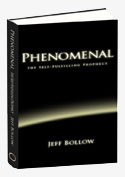This is Not What You Think It Is
This is Not What You Think It Is

I carefully chose the image on the very first post of this blog for a specific reason.
And I knew you’d jump to conclusions.
That image, combined with the article’s title, is deceptively evocative. When you see it, you attach a meaning to it. And depending on your current outlook on life, that meaning will color how you read the article.
If you’re reading this blog chronologically (before you’ve read the book), I’ll bet dollars to donuts you’ve got the wrong idea.
In this article, I won’t tell you what the image means. (In fact, I’ll never explicitly tell you.) But go back to it when you finish reading the book. You'll know immediately. And in that moment of realization, you’ll see a new layer to that article.
I’m not being cheeky or presumptuous. I know this because I know how your mind works.
I’ll prove it to you.
LESSONS FROM A MOVIE THEATRE
Have you ever predicted the end of a movie?
You’re sitting there, edge of your seat, gripping the armrests — when suddenly an idea pops into your head. You extrapolate that idea, and predict the ending. "I'll bet I know how it ends."
You know what happens when you’re right?
You groan.
Rather than take pride in your exceptional neural processing skills (you little smartie), you throw something at the screen. You complain about the quality of storytelling these days. You proclaim, “I could do better than that!!”. (If this happens, I have some screenwriting software I can recommend. Ha ha.)
You get upset at the writer.
Why?
Because you could see it coming.
When you commit to a story — watching a movie or TV show, reading a book, or even listening to a co-worker — you expect the storyteller to be smarter than you. It’s his story after all, and if you can see the end coming, then you could’ve written it. And if anybody could’ve written it, then it’s… well… boring. Unimaginative. Uncreative.
If you can predict the end from the start, the story isn’t worth telling. Why? Because it’s obvious. Perhaps that story has already been told. Maybe it’s not complex enough to engage the audience. For whatever reason, it doesn’t add value to the audience’s life.
And when that happens, it has done the worst thing imaginable:
It has wasted your time.
THE CLOCK KEEPS TICKING
It’s almost cliché to say that “time is our most precious commodity.” But cliché or not, it’s true.
Profoundly true.
We human beings usually live on this Earth between 60 and 90 years. The average is about 75. Against the unimaginably vast expanse of infinite time, it’s not even a flicker of a fraction of a speck of a wisp of a moment.
I found a “death clock” online a few months ago. You answer a few questions and it predicts the date of your death, and then proceeds to tell you how many years, months, days, minutes and seconds you’ve got left until you bite the big one.
16,138 days, apparently. That's what I have left. About 44 years. I'll kick it at 81. Not too bad.
According to Malcolm Gladwell in the book Outliers (a book I just finished reading; fascinating read, although I think he misses something larger), it takes a minimum of 10,000 hours to become a master at something. (And oddly enough, if you just put in the hours, you will succeed.)
Ten thousand hours. That equates to:
- Just under 5 years at 40 hours per week every week.
- Just over 19 years at 2 hours per week on every weekday.
- About 27 and a half years if you give it one hour every day.
Think about that.
If you spent just one hour a day — every day — diligently practicing guitar (with the intent to improve) for the next 27 years, you'd be a master at it. If you spent that time painting, you’d be a master at that. If you spent that time working on calculus equations, you’d rival Einstein.
16,138 days doesn’t sound so bad.
Except that that’s all I have (if I live the life of a statistic).
And how many things can I master in that time?
A SIMPLE EQUATION
Every week of our lives holds 168 hours.
At the time of this writing, most people typically spend 40 of those hours (if they have a nice boss) in a job they don’t like, which they do for money. (And even if it’s a job they do like, it’s often an “interim” job.) That leaves 128 hours.
If they sleep well, they get 8 hours per night — about 56 hours per week.
Remove two hours each day for eating, bathing and other unmentionables… another hour 5 days each week for getting to and from work and the grocery store, and (being very generous) we’re left with about 50 hours per week.
How much TV do you watch? Do you have kids? Do you eat out at restaurants? Do you go to the movies? Take work home? Study? Commute to work?
Subtract all that, too.
How much of your day is spent doing what you want to be doing with your life? How many hours each week are you devoting to becoming a master of the thing you’re most passionate about?
And how many hours each day are you wasting?
THE ART OF WASTE MANAGEMENT
Every single day, you spend precious hours, minutes, seconds… that will never exist again. And although the “death clock” is an amusing perspective, the real truth is much more dramatic: We have no idea when our time is up.
You could die tomorrow. I could die tomorrow. Or it might happen a month or a year from now. If it was a year from now, my “death clock” just shrank from 16,138 days… to just 365! We don’t know. We can’t know.
Literally. Every. Moment. Counts.
The things you do with your time are profoundly important. And even if we don’t treat every day as if that were true, we intuitively sense that it’s true.
And that’s why we get annoyed when a movie turns out to be a dud. “Well that was 2 hours of my life I’ll never get back again.” (It's also why we re-watch movies we love — because we know they won't waste our time!)
We hate investing our time into something that seems valuable, only to have it wasted. Even if we aren’t diligent about how we spend the rest of our time — we get very frustrated and deeply annoyed when some else wastes our time.
Like the writer of a movie. Or the writer of a blog. :)
So we guard our time.
Our brains cull the information in an article like this — or in a movie in the theatre — and process that information immediately — as we're reading (or watching). We're looking for patterns. Looking for answers.
Looking for the ending.
You’re trying to see if you can skip ahead and stop wasting time on this particular movie/article/book/conversation/whatever. You’re trying to save some minutes, hours, weeks, months, years… of waste.
That way (theoretically) you can use that time to master something instead. (Whether you'd actually spend your time doing that is beside the point. Ahem.)
LOOKING BEYOND THE MOVIES
So how can the writer of that movie ensure you’ll be satisfied with your time spent on his story?
He can give you more than you expect. He can “under-promise” and “over-deliver”. He can make you think you’re going in one direction, and then create a twist that reveals an even better destination.
That’s when you’re satisfied. When you get more value than you're expecting.
A good writer (or, I should say, a good communicator) understands one thing:
Communication is sharing value.
When you talk to someone, where is the value in it? Are you giving them something? Are they giving you something?
A fictional story needs entertainment value. As your mind is figuring out the ending, the writer should be anticipating your mental dexterity, and incorporating it into his story. The writer should know you’re trying to predict the end, and find a satisfying alternative surprise. That’s what the audience is looking for.
In movie terms, it’s called a twist. And a genuine unexpected twist adds value to the experience.
The same can be said for all communication.
It must add value — or it’s wasting the audience’s time.
WHAT DO WE HAVE HERE?
The “story” of Phenomenal is not what you think it is.
You think it’s a self-help book.
Two things:
- This is not a self-help book.
- It’s written for you (assuming you’re human).
Self-help books are specifically written for an audience looking to improve themselves. While it’s true that Phenomenal will dramatically improve the quality of your life — and it's true that that audience will like this book — that’s only a side-effect.
Imagine if a smoker inadvertently stumbled across a book that showed him how his lungs work.
Imagine that he sees and grasps exactly what the smoke is doing to him, in a way he never really appreciated before. Now imagine he responds by quitting smoking. His lungs heal because he’s stopped inhaling carcinogens all the time.
In that analogy, the book wasn't written to help smokers kick the habit. It was written to explain how the lungs work.
Phenomenal is like that.
Only it goes well beyond the lungs.
So, to enable me to give you the maximum possible value, I need to ask for something from you right up front. I need you to expect that this writer knows what he's doing.
THE GREATEST GIFT IN THE WORLD
This isn’t like most blogs — with short, punchy, easily-digestible articles. (“The Top 10 Ways to Increase Your Profitability”)
- This site is here to reveal the phenomenal experience. I’m writing for audiences that will read this well into the future. I'm going into this with the assumption that these words will be read 100 years from now.
And I’m going to write some things that will stretch your credulity. Like that bullet point.
You’re going to think it’s “hype”. Or that I’m delusional. Or you’re going to think you’ve got it all figured out ahead of time. (No bonus points if you’re reading this after you read the book.)
Sometimes, you’re not going to believe me. I know this, because I would think the same things if I was you.
Because that’s how our minds work.
We’re assessing the info: “Is this valuable to me? Is it going to waste my time? Is it bad for me?” It’s why our society has become so cynical and jaded. There’s a ton of information flying around — and most of it exists to waste your time... because few people understand how truly precious your time really is.
We process information by comparing it to what we already know. If the movie looks like something you've seen before, you will assume similarities.
It’s how our minds work.
So the greatest challenge comes when we’re presented with a new paradigm. A new way of thinking. An idea or insight that changes your perspective.
Phenomenal introduces a new paradigm.
And if I do my job correctly, the puzzle pieces I write in these blog posts will be crystal clear when you snap them all together.
And I can assure you, I would not have started this venture if I wasn’t 100% convinced that I could snap this puzzle together effectively. I don’t exactly have an international reputation to uphold, but I do have some professional credibility I’d rather not blow.
So what it comes down to is this.
Like the writer of a movie, I’m going to ask you to trust me.
When you go to the movies, you're saying to the writer:
“I will give you two hours of my life, if you promise to tell me a story that’s more creative and unpredictable than I could come up with.”
If the writer delivers, you’re happy. It was worth the investment.
If he doesn’t, you won’t trust him again anytime soon. (Even though it was probably the director, editor, producer or marketing people that really screwed it up. Poor writers. Always shouldering the blame.)
MY PROMISE TO YOU
This website will ask for more than 2 hours of your time.
And time is your most precious commodity.
If you will give me your trust, I make this promise to you today:
- I will not waste your time.
There's no "hype" here. I promise to deliver the phenomenal value I'm claiming I will.
Every article I post and every book I write, will be worth the time you spend reading it. Not every post will be this long. Some will meander (like this one did), because I don't always have time to edit them down.
But they will always add up in the end. I won’t publish anything to this blog that doesn’t have a point, a purpose, a message — even if it's not immediately clear.
And it will be worth the ride.
And you'll know when you have a complete understanding of Phenomenal when you understand why I chose that opening image.
So subscribe to the feed, and keep up to date on the articles. I promise a phenomenal experience.
And remember:
Literally. Every. Moment. Counts.
Make today phenomenal.
![]()
Next up, Article #3:
How to (Accurately)
Predict the Future

Phenomenal: The Self-fulfilling Prophecy is a dynamic new nonfiction book from author Jeff Bollow. You can pre-order your signed, Limited Edition first printing copy with our zero risk buyback guarantee right now. Visit the Pre-Order page for full details.





